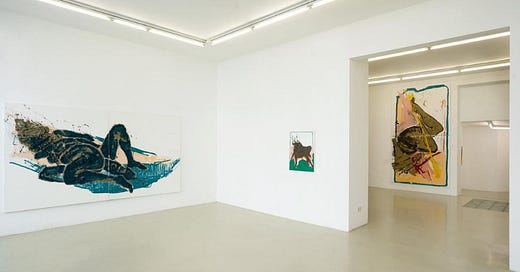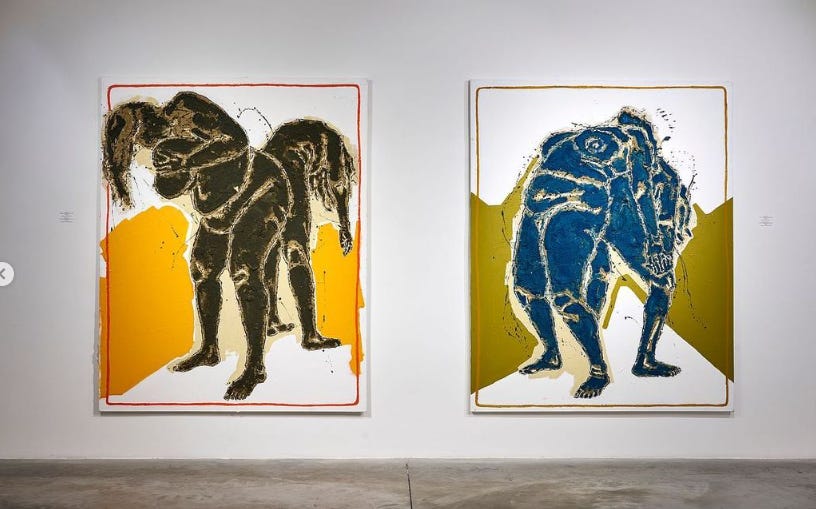One thing about me , I'm going to visit the local museum! It's an activity I would recommend for multiple reasons, one being that it's the best way to learn about the history of the country you're in. A nation's future and present vision is often also expressed by its artists. On this occasion, I went all the way to Montenegro to discover an intimate body of work.
In July last year, after an intense 7-day hiking trip in the Balkans through Montenegro, Kosovo, and Albania, it was time to return to normal altitudes and embrace my other unavoidable hobby — a natural tendency, if you like." I grew an intense bond with the people I had just weathered extremely high altitudes with—altitudes I can never fully disclose to my African mother; darling can never find out I hiked through a thunderstorm for example. But this bond was not strong enough to convince a batch of sunbathing-obsessed Dutchies to spend their day in a museum.
With that initial apprehension of exploring a new city by myself—a Black woman in a foreign country—sampling the local atmosphere and smiling at strangers I locked eyes with, it was the gaze of a kindly, reclining grandma that reassured me: I’m good here; people are friendly.
My first stop was Karver, tucked under a bridge and once a banja (Turkish for bathhouse) turned bookstore. My mission was to find landscape art books by local artists. After seeing so many different versions of the mountains I wanted to harbor those memories. My creative compass led me precisely to this destination, where Montenegrin musicians, artists, and writers display their work for others to see and hear. I met the owner who helped me find the perfect books. I didn’t know she was the owner but she had the most rich aroma and Abrohamovich aura that drew me to her. We talked about the mountains, art and her theatre career. Turns out she was a very accomplished and talented woman.
After having a yummy 1,70 EUR iced coffee I was off to the main act. I visited the Moderna Galerija, Podgorica. I was greeted by a lovely lady who asked me if wanted a tour(I declined -I prefer asking questions after)- I don’t recall paying for the exhibition.
Albana Ejupi is an artist who explores the intricate relationship between the authentic human body and the intimacy associated with cohabitation. She was born in Pristina, Kosovo, and works in Vienna, Austria. Ejupi (1994) once intended to study medicine but turned to art as she understood it was always a part of her life. Her interest in identity and what it means to be human led her to focus on the body. Her work examines various connections and reflects the diversity of human experience, touching on age, memory, love, pain, and healing.
A desire for intimacy
Entering the first-floor space, I marvelled at the size and colours of Ejupi’s work. I adore giant form art—it immerses you completely, leaving nowhere to look but at the details. So, I was happy to take my time. Initially, I couldn't look too long, as at first, it appeared to be just naked bodies. But after confronting my shame around nudity, I took it in and saw there was more going on here.
What I feel about this work is its intimacy—not directly because it’s nudes. Once you observe the vulnerable scenes she painted, lovers lying together possibly after intimacy but also during, you see it’s not about elegant poses or perfect bodies. These are real bodies sharing real intimacy.
My initial response -to nudity was natural but also influenced by how we have come to perceive the female body or nude bodies in general in art. Hypersexualisation has reduced the body to an object of desire, yet its vulnerability and the universality of nakedness bring us back to what it is to be human. It's almost brave to revisit this object of desire and tell a different story of yearning, reflecting on real-life relationships and interactions that are increasingly questioned due to social media and the evolving dynamics of gender relations and identity.
With that in mind, Ejupi’s bodies are carefully chosen, drawn from photographic sketches of real people. These bodies move, giggle, and exude warmth. The canvas is so large, and the colours so vivid, that it feels impossible not to be immersed in this intimate experience. Here, at its most vulnerable, the body becomes the stage for individual life experiences. Life has left its mark on these bodies.
The postures the subjects take are powerful and gentle, conveying the universality of desire. This desire is not merely for its own sake but for closeness and a sense of wholeness within cohabitation. In today's world, the prevalence of situationships and not mere sexual promiscuity reflects this desire, there is more than just sex in demand, intimacy is a timeless pursuit. In Ejupi’s works her subjects gaze at and into each other with longing, both external and internal, seeking solutions perhaps. Portraying this conversation on such a large scale was both clever and personal. These positions are familiar and a human observation of longing.
Embracing Authenticity and Intimate Exploration
There’s also something about the rejection of popularised notions. A set body type being desirable or even the taboo of wanting too much- it’s generous of Ejupi to not only make work that questions these notions but also shares these intimate questions. In an age of growing superficiality and forced authenticity, finding work that also shares the process and struggle of achieving true authenticity and the intimate contemplation of the artist is worthwhile. Not everybody has to be Marina Abrahamovic but her work touches many because of its rawness.
“I want to understand what it means to be human,” says Ejupi and with that question, she takes on this exploration. Earlier work featured the human relationship with animals- which I didn’t find so interesting but this search is honest.
The taboo of sexuality is also a topic her work looks at -it’s not clear what the gender is of the subjects. This sense of ambiguity is radical to the classic nude. I found it telling of today’s feminism, as perceptions of sexuality, beauty and love relations have evolved and so has feminism. The feminism of our time would be to express individual experiences and perceptions making them visible in the freedoms that are exercised in everyday life without formal obstacles.
Ejupi like many accomplished young people from the Balkan region, reminded me the West does not have a monopoly on cultural sophistication. I could only describe the countries I’ve visited as intellectually and culturally refined. There is so much “fatherland love” and a real appreciation for a rich history and community. Incorporating sand from her home country Kosovo in her work, she injects her heritage. The artist also plays a vital role in future thinking. She reflects heavily on the modern-day spiral; what does it mean to be human when you’re more loosely tied to one another? Social media has created connections but it also fuels the sensation of estrangement. Speed and accessibility do not equal depth and require a culture of quality time, space, pace, patience and understanding.
Follow your creative compass
I'm not one to exaggerate the kindness of locals in a foreign country, but I've had lovely experiences in the Balkans. The first time in 2016, I was determined to visit Kosovo, and my darling questioned whether that was a good idea. I ended up having the time of my life in Pristina, treated like somewhat of a celebrity as I was allowed to cut queues at the club and was fed endless free drinks and conversation by our bartender. My natural calling to explore has never let me down and I encourage you to do the same. Gallivanting pays off!
This exhibition has ended but you can find Ejupi’s work on IG. Lukas Feichtner Gallery, Vienna represent her.











